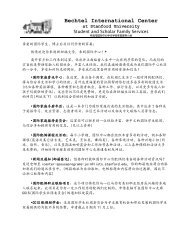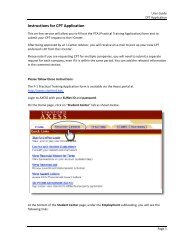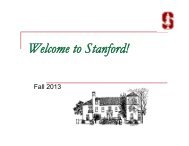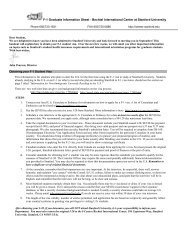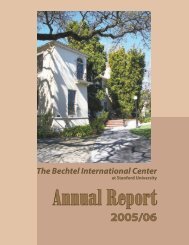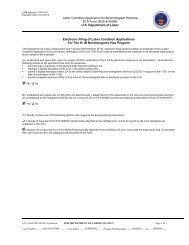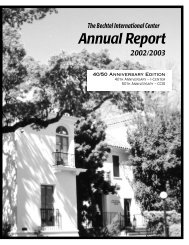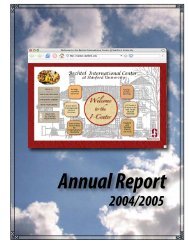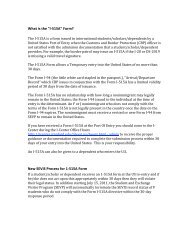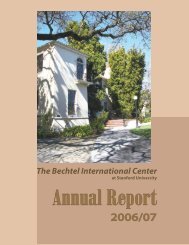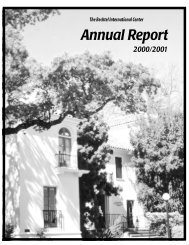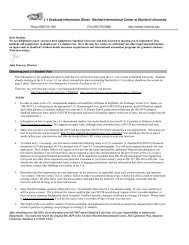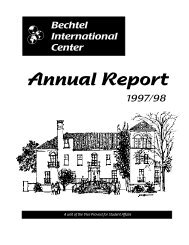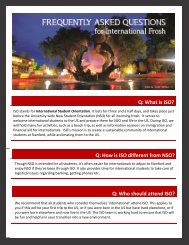2011/12 - Bechtel International Center - Stanford University
2011/12 - Bechtel International Center - Stanford University
2011/12 - Bechtel International Center - Stanford University
You also want an ePaper? Increase the reach of your titles
YUMPU automatically turns print PDFs into web optimized ePapers that Google loves.
Student-related reforms include:<br />
1. Expanding eligibility for 17-month extension of<br />
optional practical training (OPT) for F-1 international<br />
students to include students with a prior degree in<br />
Science, Technology, Engineering and Mathematics<br />
(STEM).<br />
2. Allowing for additional part-time study for<br />
spouses of F-1 students.<br />
3. Expanding the number of Designated School<br />
Officials (DSOs) at schools certified by DHS to enroll<br />
international students.<br />
Employment based reforms include:<br />
1. Providing work authorization for spouses of<br />
certain H-1B holders.<br />
2. Harmonizing rules to allow E-3 visa holders from<br />
Australia and H-1B1 visa holders from Singapore and<br />
Chile to continue working with their current employer<br />
for up to 240 days while their petitions for extension of<br />
status are pending.<br />
3. Allowing outstanding professors and<br />
researchers to present a broader scope of evidence of<br />
academic achievement.<br />
EMPLOYMENT- BASED CATEGORIES<br />
FY 20<strong>12</strong> H-1B Cap<br />
The fiscal year 20<strong>12</strong> H-1B Cap was reached on<br />
November 23, <strong>2011</strong>, and the fiscal year 2013 H-1B<br />
filing season opened on April 2, 20<strong>12</strong>. Petitions filed<br />
for beneficiaries employed at institutions of higher<br />
education, non-profit research institutions and<br />
government research organizations remain exempt<br />
under the cap. Other petitions that remain exempt<br />
under the cap include the first 20,000 petitions filed for<br />
a beneficiary who has a US master’s degree or higher.<br />
Permanent Residence<br />
Change in PERM Policies<br />
Following the decision of the Board of Alien Labor<br />
Certification Appeals (BALCA) that unlike the standard<br />
PERM filing advertising provisions that specify a<br />
print ad requirement, the Special Handling rules do<br />
not prohibit advertising in an online or electronic<br />
national professional journal, the Office of Foreign<br />
Labor Certification (OFLC) reversed its prior policy that<br />
disallowed ads in electronic or online journals to satisfy<br />
the national journal ad requirement in Special Handling<br />
PERM cases.<br />
16 <strong>Bechtel</strong> <strong>International</strong> <strong>Center</strong> Annual Report <strong>2011</strong>/<strong>12</strong><br />
VISAS, USCIS FORMS AND FEE CHANGES<br />
Visa Interview Program<br />
In January 20<strong>12</strong>, the Departments of State and Homeland<br />
Security began a two-year visa interview waiver pilot<br />
program (concluding on January 19, 2014). This program,<br />
which is being piloted only at certain consular posts,<br />
permits consular offices for certain nonimmigrant<br />
categories to waive interviews for qualified applicants who<br />
are renewing their visas within 48 months of the expiration<br />
of the previous visa, and within the same classification as<br />
the previous visa. The interview waiver pilots are being run<br />
in India, China, Brazil, Norway, Mexico and Russia. Others<br />
may be added.<br />
Visa Sanctions affecting Iranian Citizens<br />
On August 10, 20<strong>12</strong>, President Obama signed into law the<br />
Iran Sanctions, Accountability, and Human Rights Act of<br />
20<strong>12</strong>_ [Pub.L. 1<strong>12</strong>-158].<br />
Section 501 of that law provides:<br />
(a) The Secretary of State shall deny a visa to, and the<br />
Secretary of Homeland Security shall exclude from the<br />
United States, any alien who is a citizen of Iran that the<br />
Secretary of State determines seeks to enter the United<br />
States to participate in coursework at an institution of<br />
higher education (as defined in section 101(a) of the Higher<br />
Education Act of 1965 (20 U.S.C. 1001(a)) to prepare the<br />
alien for a career in the energy sector of Iran or in nuclear<br />
science or nuclear engineering or a related field in Iran.<br />
This provision became effective with respect to visa<br />
applications filed on or after August 10, 20<strong>12</strong>.<br />
USCIS ELIS electronic immigration system<br />
In May 20<strong>12</strong>, U.S. Citizenship and Immigration Services<br />
(USCIS) launched the first phase of its electronic<br />
immigration benefits system, known as USCIS ELIS with<br />
Form I-539. The system was created to modernize the<br />
process for filing and adjudicating immigration benefits.<br />
Users can create accounts to use the ELIS I-539 (on a<br />
voluntary basis, as paper filing will continue to be available)<br />
to request the following benefits:<br />
•<br />
•<br />
•<br />
An extension of status as a: B-1, B-2, M-1 or M-2<br />
A change of status to: B-1, B-2, F-1, F-2, J-1, J-2, M-1 or<br />
M-2<br />
A reinstatement of status to F-1, F-2, M-1 or M-2<br />
H-1B Related Site Visits by US Dept of Homeland Security<br />
Inspectors<br />
This year, many universities around the country received<br />
H-1B related site visits by US Department of State<br />
Inspectors. <strong>Stanford</strong> <strong>University</strong> also had a number of<br />
such visits. On at least four occasions, the inspectors<br />
came directly to the I-<strong>Center</strong> to review H-1B files before



